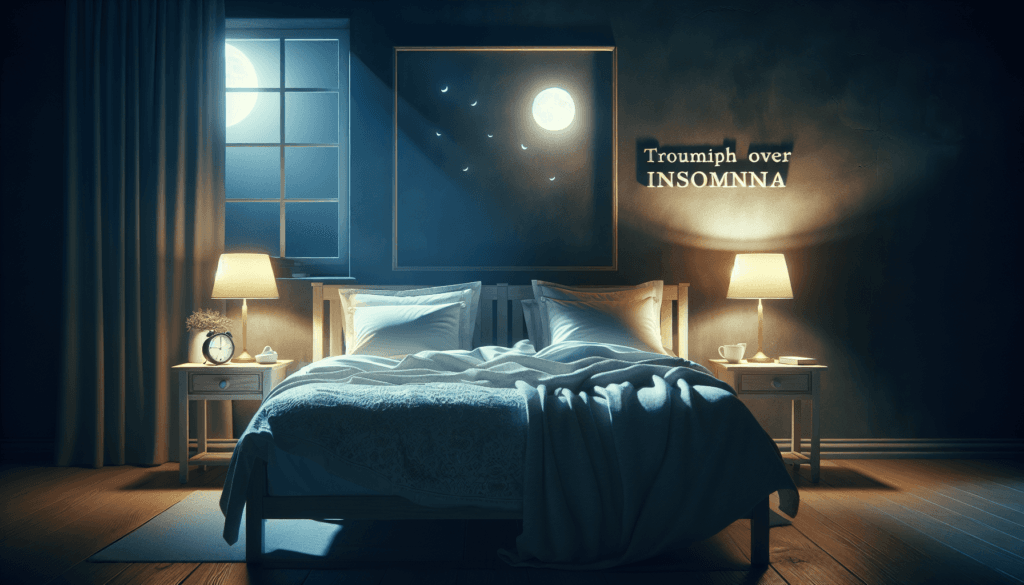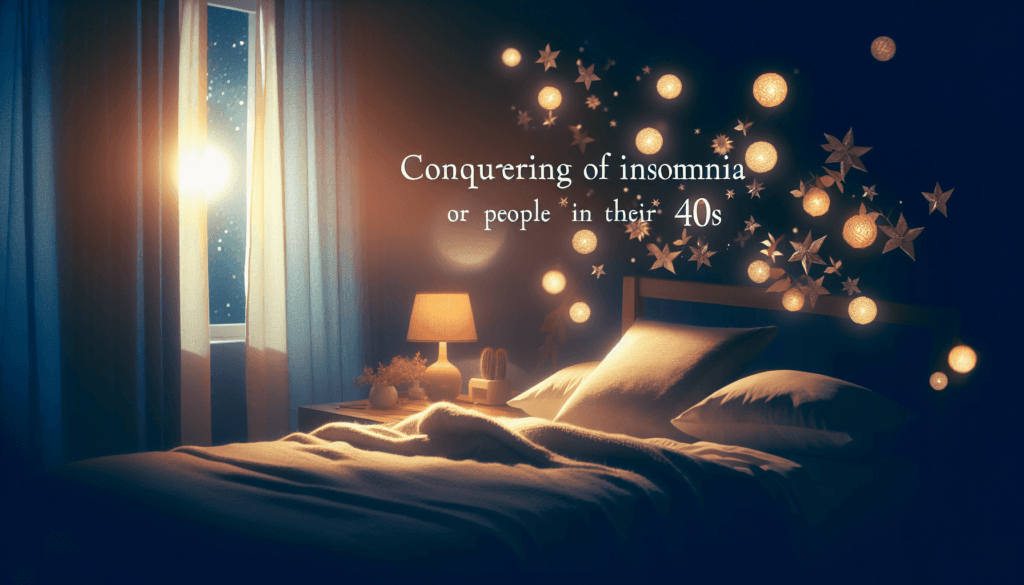Have you been struggling to get a quality night’s sleep as you enter your forties? You’re not alone. Insomnia is a common issue for many in this age group, but understanding its complexities and addressing it effectively can make a significant difference.

This image is property of images.pexels.com.
Table of Contents
Overview
Insomnia, the chronic inability to fall asleep or stay asleep, can wreak havoc on your health, mood, and overall well-being. This article will provide an in-depth look into the causes of insomnia for individuals in their forties and explore effective strategies to combat it.
Thesis Statement
“Conquering Insomnia: The Sleep Revolution for 40-Somethings” aims to arm you with the knowledge and tools necessary to achieve better sleep. Through examining historical trends, current practices, and future implications, we will illuminate the path toward restful nights.
Historical Context
Evolution of Sleep Patterns
Sleep disorders have existed for centuries, but their understanding and treatment have evolved dramatically. Historically, sleep was dictated by natural light cycles, but today’s technology has drastically altered this dynamic. The proliferation of artificial lighting and electronic devices has significantly impacted sleep quality.
Research Milestones
The study of sleep truly began in the mid-20th century with the discovery of REM cycles. Since then, continuous research has provided insight into various sleep disorders, including insomnia. The last few decades have seen significant advancements in the understanding of how lifestyle, stress, and aging affect sleep.
Current Trends
Increased Awareness
Recent years have brought a heightened awareness of the importance of sleep, driven by research linking sleep quality to overall health. Medical professionals now emphasize sleep hygiene as a crucial component of health.
Technological Interventions
Today’s market is flooded with sleep aids, from apps that track your sleep patterns to devices that simulate natural light. There’s an increasing reliance on technology to diagnose and treat sleep disorders, reflecting our growing understanding of the science behind sleep.
Sleep Studies and Therapies
There’s a rising trend in sleep studies and cognitive-behavioral therapy for insomnia (CBT-I). These approaches provide comprehensive solutions, often bypassing the need for medication.

This image is property of images.pexels.com.
Key Concepts and Definitions
Insomnia
Insomnia is more than just the occasional sleepless night. Clinically, it is defined as difficulty falling asleep, staying asleep, or waking too early, occurring at least three times per week and lasting for at least three months.
Cognitive-Behavioral Therapy for Insomnia (CBT-I)
CBT-I is a structured program that helps you identify and replace thoughts and behaviors that cause or worsen sleep problems. This therapy is considered the gold standard for treating chronic insomnia.
Causes of Insomnia in 40-Somethings
Biological Factors
As you age, changes in your sleep architecture can lead to more fragmented sleep. Lowered levels of melatonin, a hormone that regulates sleep-wake cycles, can contribute to insomnia.
Lifestyle Factors
Busy work schedules, parenting challenges, and the physical changes associated with aging can increase stress and anxiety levels, both of which are significant contributors to insomnia.
Medical Conditions
Chronic pain, menopause, and other age-related health issues can interfere with sleep. Conditions such as sleep apnea and restless leg syndrome are also more prevalent in people over forty.

This image is property of images.pexels.com.
Break it Down: Strategies for Better Sleep
Establishing a Sleep Routine
Creating a consistent sleep schedule can help regulate your body’s internal clock. Going to bed and waking up at the same time every day, even on weekends, is crucial.
Optimizing Your Sleep Environment
Ensure your bedroom is conducive to sleep. A cool, dark, and quiet room is ideal. Consider blackout curtains and white noise machines if necessary. The right mattress and pillows are also essential.
Limiting Screen Time Before Bed
Exposure to blue light from phones, tablets, and computers can disrupt melatonin production. Aim to turn off electronic devices at least an hour before bed.
Exercise and Diet
Regular physical activity can help regulate sleep patterns. However, avoid vigorous exercise close to bedtime. A balanced diet, rich in fruits, vegetables, and whole grains, also supports healthy sleep.
Stress Management
Techniques such as mindfulness, meditation, and deep-breathing exercises can reduce stress and promote relaxation, making it easier to fall asleep.
Example 1: Case Study
John’s Journey to Better Sleep
John, a 45-year-old marketing executive, struggled with insomnia due to high stress and long work hours. By implementing a consistent sleep routine, practicing mindfulness, and reducing screen time, John was able to significantly improve his sleep quality. His case illustrates the effectiveness of lifestyle modifications in managing insomnia.

Example 2: Alternative Therapies
Herbal Remedies and Supplements
Various natural remedies such as valerian root, melatonin supplements, and chamomile tea have been shown to aid sleep. While these options work for some, they should be used with caution and ideally under the guidance of a healthcare provider.
Acupuncture
This traditional Chinese practice has been found to benefit some individuals with insomnia by promoting relaxation and reducing stress. More research is needed, but acupuncture presents a promising complementary therapy.
Compare Different Points of View
Medication vs. Natural Remedies
Medications can provide quick relief but often come with side effects and the risk of dependency. Conversely, natural remedies may take longer to be effective but generally have fewer side effects. Here’s a comparison table:
| Aspect | Medication | Natural Remedies |
|---|---|---|
| Effectiveness | Immediate but temporary | Gradual and long-term |
| Side Effects | Risk of dependency, side effects | Minimal side effects |
| Accessibility | Prescription required | Over-the-counter |
| Cost | Often higher | Generally lower |
| Sustainability | Not advisable for long-term use | Suitable for long-term use |

Impact Assessment
Individual Health
Prolonged insomnia can lead to serious health issues such as cardiovascular disease, diabetes, and mental health disorders. By addressing insomnia, you can improve your overall health and quality of life.
Workplace Productivity
Insufficient sleep affects cognitive function, leading to decreased productivity and higher error rates. Improving sleep can enhance job performance and reduce workplace accidents.
Future Directions and Implications
Predictions for Sleep Technology
The future will see more advanced sleep tracking devices and personalized sleep solutions. With the rise of wearable technology, real-time data can provide insights into sleep patterns, leading to more effective interventions.
Societal Impact
As society becomes more aware of the importance of sleep, there may be broader cultural shifts. Employers might prioritize employee well-being, and urban planning could incorporate more designs that promote healthy sleep environments.
Conclusion
Summarize
Insomnia in your forties can be a daunting challenge, but understanding its causes and implementing proven strategies can bring significant relief. From establishing a sleep routine and optimizing your sleep environment to exploring alternative therapies, various approaches can help you achieve better sleep.
Final Thoughts
Insomnia doesn’t have to rule your life. By taking a proactive role in managing your sleep health, you can improve not only your rest but also your overall well-being. What steps will you take today to conquer your insomnia?
Your journey to better sleep starts now. For more information, refer to our additional articles on sleep hygiene and stress management.
Arianna Huffington: The Sleep Revolution
Finding Hope: Effective Strategies for Managing Depression and Anxiety in Your 50s

